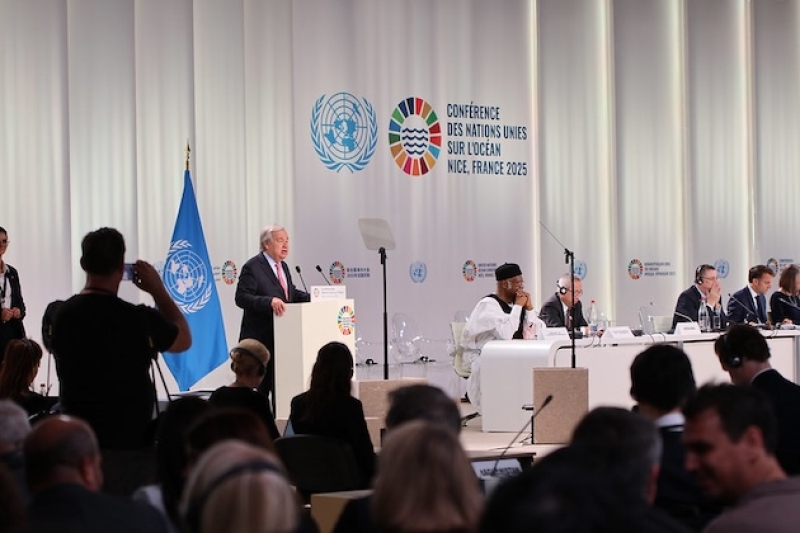- CA Yunus pays homage to Liberation War martyrs on Victory Day |
- Bangladesh capital market extends losing streak for second day |
- Bangladesh celebrates Victory Day Tuesday |
- 'Different govts presented history based on their own ideologies': JU VC |
UNOC3: Leaders Unite for Urgent Global Ocean Action

UN Secretary-General António Guterres addresses the opening of the 2025 UN Ocean Conference. Credit: UNDESA
The world has converged along the Mediterranean Sea to affirm its commitment to the sustainable use and protection of the ocean.
June 9 marked the first day of the 2025 United Nations Ocean Conference (UNOC3), held in Nice, France. The overarching theme of this year’s conference is “Accelerating action and mobilizing all actors to conserve and sustainably use the ocean,” aiming for urgent global steps to conserve oceans, seas, and marine resources.
Over 50 heads of government and state, along with thousands of scientists, NGOs, business leaders, Indigenous peoples, and civil society groups, are participating.
In his opening remarks, UN Secretary-General António Guterres called on countries to make “bold pledges” toward conserving the ocean.
“We must also strengthen maritime security as a pillar of sustainable development. And we must embed ocean priorities across climate, food systems, and sustainable finance.”
Guterres highlighted progress on global agreements, such as the WTO’s agreement on fisheries and the IMO’s commitment to reach net-zero emissions from shipping by 2050.
“This proves multilateralism works—but only if we match words with action. By developing national plans aligned with global targets; by harnessing science, driving innovation, ensuring fair access to technology; empowering fishers, Indigenous peoples, and youth; and above all, by investing.”
The conference addresses key concerns in ocean conservation and governance. Climate change has dramatically affected ocean systems, with extreme heating stressing food systems and ecosystems. The Blue Economy—industries relying on oceans—must become more inclusive and resilient. Plastic pollution also remains a critical challenge, with over 23 million tons entering the ocean annually.
French President Emmanuel Macron called the conference a “victory against indifference,” but warned it was a “fragile victory,” requiring rapid action to avoid backsliding.
“We need to revitalize multilateralism behind the UN Secretary-General,” said Macron. “The only way to meet that challenge is to mobilize all actors—not just heads of state, but also scientists.”
Costa Rican President Rodrigo Chaves Robles stated that the conference should be remembered as the moment the world recognized that protecting the ocean is a moral and economic necessity.
“Let’s leave behind this indifference. Let’s build together a new contract… so that nobody exploits anything on other people’s backs.”
Countries were urged to ratify the UN Agreement on Marine Biological Diversity of Areas Beyond National Jurisdiction (BBNJ), adopted in 2023. Fifty countries have committed so far.
The conference is expected to adopt the Nice Ocean Action Plan, including outcomes based on a negotiated political declaration and voluntary commitments. These aim to spark urgent, inclusive, and science-based action to protect the ocean for future generations.
The commitments should also reflect the perspectives of developing nations, especially Small Island Developing States (SIDS). In the first plenary, Palau’s President Surangel Whipps Jr. noted that island nations have long been “the voice for the ocean.”
“Ocean ecosystems don’t follow national boundaries… We need a governance framework that reflects that reality.”
Marshall Islands President Hilda Heine emphasized the moral and generational responsibility to protect the ocean.
“This is not just about environmental stewardship. It’s a fusion of traditional wisdom and modern science—where conservation is driven by community, not just compliance.”
“Our call today is not from privilege or abundance, but from a frontline experience.”

